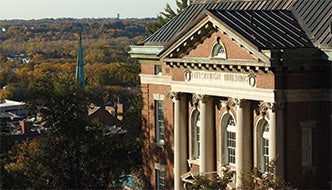 Lally School master’s students are taking their academic knowledge to the next level by learning to identify commercialization pathways for lab research discoveries and inventions through the Lally Masters’ Scholars Research Program (MSRP). Now in its second year, more than 50 Lally master’s students have signed up to be considered for the highly selective voluntary program. Lally M.S. and MBA students are paired,
individually or on teams, with researchers on campus to help them convert their findings to benefit society.
Lally School master’s students are taking their academic knowledge to the next level by learning to identify commercialization pathways for lab research discoveries and inventions through the Lally Masters’ Scholars Research Program (MSRP). Now in its second year, more than 50 Lally master’s students have signed up to be considered for the highly selective voluntary program. Lally M.S. and MBA students are paired,
individually or on teams, with researchers on campus to help them convert their findings to benefit society.
This includes partnering with Lally faculty as well as those in the schools of Engineering or Science, including the biomedical engineering department and the Center for Biotechnology and Interdisciplinary Studies (CBIS). The MSRP program aligns with the interdisciplinary approach at Rensselaer and collaborative efforts among faculty and students.
“There is a growing demand among business students for opportunities to engage with faculty in science and engineering on commercializing technology,” explained Gina O’Connor, associate dean for academic affairs at Lally. “This program leverages the unique interdisciplinary environment and world-class research at Rensselaer and builds skills to create businesses around emerging innovations.”
There is a growing demand among business students for opportunities to engage with faculty in science and engineering on commercializing technology. This program leverages the unique interdisciplinary environment and world-class research at Rensselaer and builds skills to create businesses around emerging innovations.”—Gina O’Connor
The program is facilitated by regular progress meetings between students and the faculty within Lally. This allows for students to learn about one another’s progress and for students and faculty to provide feedback to each team. The outcomes of these projects foster better management practices, commercialization of technology, and/or new approaches to global challenges.
The projects are completed while the student is enrolled at Lally. Past participants in this program have received research fellowships as a result of their work, and others have helped faculty license technology or have participated in the establishment of a high-tech venture.
Examples of MSRP projects include:
Non-Medical Applications of Sensing Technologies
M.S. Technology Commercialization and Entrepreneurship students Ashwin Gapchup ’14 and Nate Mason ’14 worked with Eric Ledet, associate professor of biomedical engineering in CBIS. The team has been given the rights to develop non-medical applications of associate professor Ledet’s sensing technologies, and they won a summer grant to participate in the RPI-Foundry program, a weekly entrepreneurial workgroup hosted by the Paul J. ’69 and Kathleen M. Severino Center for Technological Entrepreneurship. They also formed a legal entity to carry this business forward.
Low-Cost CT Scanning Device
MBA students Kartik Surisetty ’14 and Bo Li ’14 worked with Ge Wang, professor of biomedical engineering, on a low-cost CT scanning device. They pursued applications in their home countries of India and China, and planned to continue working on finding first customer partners after graduation.
Several MSRP students also worked with Lally faculty to further their scholarly work: Justin Lay ’14, an M.S. in Management student, studied the effect of the Dodd-Frank act on bank lending behavior.
Abena Owusu ’14, an M.S. in Quantitative Finance and Risk Analytics (QFRA) student, worked with Professor Aparna Gupta on solar-based derivatives as risk management hedges in the alternative energy industry. Abena won a Global Association of Risk Professionals fellowship award to help her continue her research with Professor Gupta beyond her graduation.
Billy Obenauer ’14 MBA worked with Professors Lois Peters and Gina O’Connor to develop a database of corporate personnel involved in breakthrough innovation projects and a methodology for tracking their career paths over time. This work was part of a larger research program on how large established industrial firms manage breakthrough innovation. Billy has since been accepted into the Lally Ph.D program and will continue his studies.


